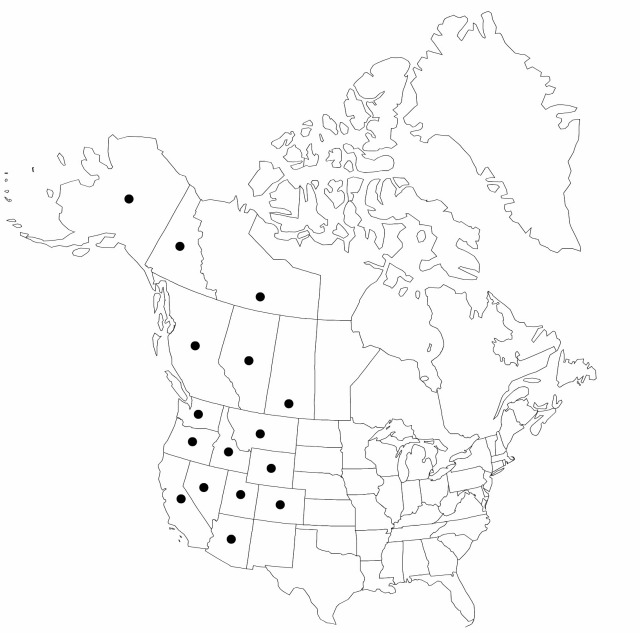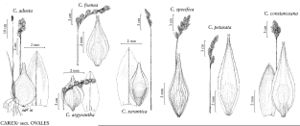Carex petasata
Amer. J. Sci. Arts 29: 246, plate W, fig. 72. 1836.
Plants densely cespitose. Culms 30–85 cm. Leaves: sheaths adaxially white-hyaline, summits U-shaped, prolonged more than 2.8 mm; distal ligules 2–5 mm; blades (2–)3–4 per fertile culm, 10–30(–40) cm × 2–4(–5) mm. Inflorescences open, stiffly erect, green, gold, or pale brown, (2–)2.5–4.5(–6) cm × 9–16 mm; proximal internode 4.5–9 mm; 2d internode (2–)5–9(–11) mm; proximal bracts scalelike, awn shorter than inflorescences. Spikes (3–)4–7, distant, distinct, fusiform, ovoid, or obovoid, 15–27 × 5.5–9 mm, base tapered to attenuate, apex acute or rounded. Pistillate scales whitish green or gold, with greenish to gold midstripe, lanceolate or ovate, 5.8–7.6 mm, ± equaling perigynia, concealing beaks, margin white, 0.2–0.7 mm wide, apex acute to acuminate. Staminate scales with white-hyaline margin (0.2–)0.3–0.7 mm wide. Perigynia appressed to ascending, whitish green to brown, conspicuously 10–19-veined abaxially, conspicuously 4–10-veined adaxially, at least 3 adaxially veins longer than achene, lanceolate to ovate, plano-convex, 6–8 × 1.7–2.4 mm, 0.5–0.9 mm thick, margin flat, including wing (0.2–)0.3–0.5 mm wide, ciliate-serrulate at least distally; beak green, red-brown, brown, or gold, white-hyaline at tip, cylindric, unwinged, ± entire to 1 mm or flat, ± ciliate-serrulate, abaxial suture with conspicuous white margin, distance from beak tip to achene (2.8–)3.2–4.6 mm. Achenes elliptic to ovate-elliptic, 2.2–3 × (1.1–)1.3–1.8 mm, 0.5–0.7 mm thick.
Phenology: Fruiting summer.
Habitat: Dry to wet meadows, grasslands, open woods
Elevation: 500 m to timberline
Distribution

Alta., B.C., N.W.T., Sask., Yukon, Alaska, Ariz., Calif., Colo., Idaho, Mont., Nev., Oreg., Utah, Wash., Wyo.
Discussion
See comment under 125. Carex xerantica.
Selected References
None.
